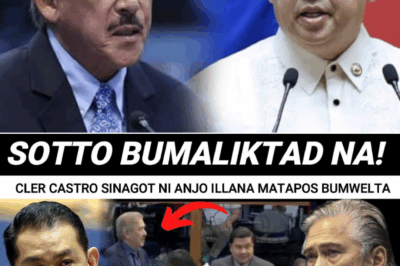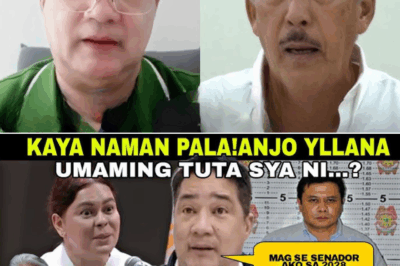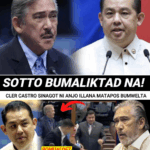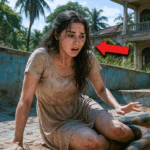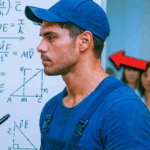The halls of the Senate erupted with tension this week as Senator Ping Lacson took center stage, unveiling what he described as hard evidence in one of the most explosive corruption scandals in recent years. The ongoing Senate Blue Ribbon investigation, which began as a probe into alleged irregularities in flood control projects, has now expanded into a full-blown controversy implicating multiple government officials and even former members of Congress.

During the heated session, Lacson confirmed that CCTV footage obtained from the Senate premises captured a critical moment involving a key witness and a sitting senator. This revelation came after weeks of speculation and behind-the-scenes maneuvering surrounding testimonies and missing witnesses tied to the corruption probe.
According to Lacson, the footage shows the arrival and movements of a witness linked to the allegations of kickbacks and falsified documents in infrastructure projects. The senator emphasized that the CCTV footage was reviewed to verify details surrounding the witness’s testimony—not, as some accused, to spy on fellow legislators. “The Senate is a public place,” Lacson stated firmly. “There is no reasonable expectation of privacy in an open government building monitored by security cameras.”
The footage reportedly ties Senator Rodante Marcoleta to witness Gotesa, whose affidavit had already raised questions about the authenticity of signatures and the involvement of high-profile figures in the misuse of public funds. Lacson confirmed that the National Bureau of Investigation (NBI) had conducted forensic analysis comparing Gotesa’s notary documents and specimen signatures, with findings suggesting inconsistencies.
As the Blue Ribbon Committee continued its probe, Lacson revealed that further subpoenas would be issued, including one to the couple Mr. and Mrs. Descaya, who previously testified about 17 lawmakers allegedly receiving kickbacks from government projects. The senator noted that their return to the witness stand was crucial to solidifying the paper trail that could connect congressional names to the anomalies.
The investigation into the Department of Public Works and Highways (DPWH) flood control projects has already uncovered ghost projects and substandard infrastructure initiatives. Billions of pesos were reportedly allocated to nonexistent or poorly executed works, with suspicious fund transfers leading investigators to trace transactions across several provinces, including Bulacan and Oriental Mindoro.
Lacson, who has long been known for his meticulous investigative work, pointed out that he had previously turned over digital copies of evidence to several key officials—including the Ombudsman and the Department of Justice. “All the documents, falsified papers, and payment records are already there,” he said. “The evidence is complete enough to file charges.”
Despite this, the case has taken a dramatic turn with the sudden disappearance of key witness Gotesa. His absence has fueled speculation that he may be in hiding—or worse, being silenced. Lacson admitted concern for Gotesa’s safety but also questioned the witness’s motives. “If your goal is true prosecution, you don’t disappear,” he remarked. “But if your goal is propaganda, you show up at the Blue Ribbon once and vanish. That’s not justice—that’s deception.”
Lacson also confirmed that the Senate is ready to issue arrest warrants for non-cooperative witnesses or implicated individuals who ignore official summons. Even former Speaker Martin Romualdez, whose name was mentioned in Gotesa’s testimony, may face an invitation through proper channels, respecting interparliamentary courtesy. “It’s not about personalities,” Lacson clarified. “It’s about accountability.”
The senator further revealed plans to scrutinize the logbooks and security records from a Makati residence allegedly linked to cash deliveries made between December 2024 and August 2025. If vehicles and visitors recorded in the logs match Gotesa’s sworn statements, Lacson said it would serve as “solid, independent corroboration” of the witness’s claims—even without Gotesa’s reappearance.

As the hearing progressed, Lacson turned his attention to the broader implications of the case. He criticized the long-standing system of budget manipulation and “realignments” within Congress, which he said often allowed legislators to redirect funds to pet projects or personal interests. “That’s how ghost projects are born,” he said. “That’s how corruption takes root—when lawmakers start implementing, not legislating.”
The senator called for the complete removal of unprogrammed funds and proposed that all assistance programs be consolidated under existing legal frameworks like the Universal Health Care Act and the 4Ps (Pantawid Pamilyang Pilipino Program). This, he said, would eliminate arbitrary disbursement of funds and curb political patronage disguised as public service. “No more guarantee letters, no more politicians dictating who gets medical help,” Lacson stressed. “That’s not our job. Our job is oversight, not implementation.”
The Blue Ribbon Committee also revealed that the Anti-Money Laundering Council (AMLC) has begun tracing “webs of accounts” potentially linked to billions of pesos funneled through contractors and public officials. Some of these accounts, Lacson noted, have already been frozen. “If fully pursued, this could lead to the recovery of massive amounts of public money,” he said. “But only if everyone cooperates.”
Meanwhile, other senators expressed concern that certain departments, like the Department of Agriculture, had doubled their allocations for farm-to-market road projects without clear justification. Lacson hinted that some of these reallocations might have originated not from the agencies themselves but from legislators seeking to divert funds from flood control projects—an alarming pattern, he said, that needs immediate correction.
President Ferdinand Marcos Jr. recently ordered government agencies to reduce construction costs by up to 50 percent to fight overpricing. Lacson welcomed the move, saying it would help minimize opportunities for corruption. “If they can really do that, we’ll see fewer ghost projects and more honest spending,” he said.
As the investigation moves forward, four officials currently detained at the Senate for contempt will remain there until charges are filed or the next adjournment of Congress. “They stay here until due process is complete,” Lacson affirmed. “At least we know where to find them.”
The senator, who recently recovered from eye surgery, assured the public that he intends to push the inquiry to its conclusion. “We owe it to the Filipino people to get to the bottom of this,” he said. “Otherwise, the cycle repeats—five years, ten years later, another scandal, another investigation. It must stop somewhere.”
As the hearings continue and the evidence piles up, the tension between truth and power grows stronger by the day. Whether this investigation will finally expose the full network of corruption—or be buried like countless scandals before it—now depends on the courage of those who still dare to speak.
News
Senate Invites Romualdez as Flood Control Scandal Explodes; Sotto Caught in Personal Controversy and Malacañang Responds to Online Feud
The political scene in the Philippines has once again erupted into chaos—this time, a combination of explosive corruption allegations, emotional…
Anjo Yllana Faces Possible Cyber Libel Case After Explosive Accusations Against Tito and Vic Sotto
What started as a string of emotional online rants may now lead to a serious legal battle. Former Eat Bulaga!…
Anjo Yllana’s Explosive Tirades Against Tito Sotto: What Really Drove the Former “Eat Bulaga” Host to Turn Against His Longtime Friend
For two decades, Anjo Yllana was a familiar face in Filipino homes—a comedian, actor, and beloved host on the legendary…
Ria Atayde at Zanjoe Marudo, Tuluyang Naghiwalay Matapos ang Matagal na Pagsubok sa Kanilang Relasyon
Isang Nakakalungkot na Balita sa Mundo ng ShowbizIsang matinding balita ang kumalat kamakailan sa industriya ng showbiz—ang relasyon nina Ria…
Daniel Padilla at Kyla Estrada, Spotted Magkasama sa Publiko — Netizens Kinilig, Katniel Fans Nagulat sa Hard Launch ng Bagong Relasyon
Sa gitna ng Halloween season, tila hindi takot kundi kilig ang hatid ng pinakabagong usap-usapan sa showbiz—ang rumored couple na…
Misteryong Hindi Malutas: Ang Pagdukot sa Anim na Magkakaibigan sa Batangas na Hanggang Ngayon ay Walang Hustisya
Isang bakasyon na dapat ay puno ng saya at tawanan ang nauwi sa trahedya at misteryo. Apat na taon na…
End of content
No more pages to load

